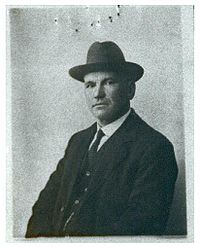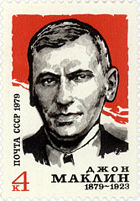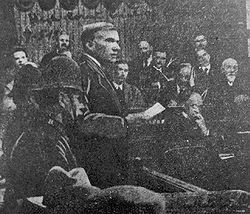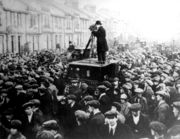
John Maclean (Scottish socialist)
Encyclopedia

Scotland
Scotland is a country that is part of the United Kingdom. Occupying the northern third of the island of Great Britain, it shares a border with England to the south and is bounded by the North Sea to the east, the Atlantic Ocean to the north and west, and the North Channel and Irish Sea to the...
schoolteacher and revolutionary socialist. He is primarily known as a Marxist
Marxism
Marxism is an economic and sociopolitical worldview and method of socioeconomic inquiry that centers upon a materialist interpretation of history, a dialectical view of social change, and an analysis and critique of the development of capitalism. Marxism was pioneered in the early to mid 19th...
educator and notable for his outspoken opposition to the First World War.
Maclean is regarded as one of the leading figures of the Red Clydeside
Red Clydeside
Red Clydeside is a term used to describe the era of political radicalism that characterised the city of Glasgow in Scotland, and urban areas around the city on the banks of the River Clyde such as Clydebank, Greenock and Paisley...
era. His imprisonment for agitation against the war earned him an international reputation and he was elected an honorary vice-president of the Congress of Soviets
Congress of Soviets
The Congress of Soviets was the supreme governing body of the Russian Soviet Federative Socialist Republic and several other Soviet republics from 1917–36 and again from 1989-91. After the creation of the Soviet Union, the Congress of Soviets of the Soviet Union functioned as its legislative branch...
and appointed Bolshevik
Bolshevik
The Bolsheviks, originally also Bolshevists , derived from bol'shinstvo, "majority") were a faction of the Marxist Russian Social Democratic Labour Party which split apart from the Menshevik faction at the Second Party Congress in 1903....
representative in Scotland.
Early life
Maclean was born in PollokshawsPollokshaws
Pollokshaws is a district on the southside of the city of Glasgow, Scotland. The housing stock mostly consists of some sandstone tenement housing, tower blocks and modern brick tenement-style buildings...
, then on the outskirts of Glasgow
Glasgow
Glasgow is the largest city in Scotland and third most populous in the United Kingdom. The city is situated on the River Clyde in the country's west central lowlands...
, Scotland
Scotland
Scotland is a country that is part of the United Kingdom. Occupying the northern third of the island of Great Britain, it shares a border with England to the south and is bounded by the North Sea to the east, the Atlantic Ocean to the north and west, and the North Channel and Irish Sea to the...
, to parents of Highland
Scottish Highlands
The Highlands is an historic region of Scotland. The area is sometimes referred to as the "Scottish Highlands". It was culturally distinguishable from the Lowlands from the later Middle Ages into the modern period, when Lowland Scots replaced Scottish Gaelic throughout most of the Lowlands...
origin; his father Daniel (1845–1888) hailing from the Isle of Mull
Isle of Mull
The Isle of Mull or simply Mull is the second largest island of the Inner Hebrides, off the west coast of Scotland in the council area of Argyll and Bute....
and his mother Ann (1846–1914) from Corpach
Corpach
Corpach is a large village north of Fort William, in the Scottish Highlands. The canal lock at Corpach Basin on Loch Linnhe, east of the narrows leading to Loch Eil, is the western sea entrance of the Caledonian Canal...
. Raised in a Calvinist household, Maclean trained as a schoolteacher under the auspices of the Free Church
Free Church of Scotland (1843-1900)
The Free Church of Scotland is a Scottish denomination which was formed in 1843 by a large withdrawal from the established Church of Scotland in a schism known as the "Disruption of 1843"...
and then attended part-time classes at the University of Glasgow
University of Glasgow
The University of Glasgow is the fourth-oldest university in the English-speaking world and one of Scotland's four ancient universities. Located in Glasgow, the university was founded in 1451 and is presently one of seventeen British higher education institutions ranked amongst the top 100 of the...
, graduating with a Master of Arts
Master of Arts (Scotland)
A Master of Arts in Scotland can refer to an undergraduate academic degree in humanities and social sciences awarded by the ancient universities of Scotland – the University of St Andrews, the University of Glasgow, the University of Aberdeen and the University of Edinburgh, while the University of...
degree in 1904. (Maclean often used the letters M.A. after his name when being published).
Political development
Maclean first came to politics through the Pollokshaws Progressive Union and Robert BlatchfordRobert Blatchford
Robert Peel Glanville Blatchford was a socialist campaigner, journalist and author in the United Kingdom. He was a prominent atheist and opponent of eugenics. He was also an English patriot...
's Merrie England
Merrie England
Merrie England may also refer to:*Merry England, an idealised conception pastoral English life*Merrie England , a book of essays on socialism by Robert Blatchford* Merrie England , a comic opera by Edward German...
. He became convinced that the living standards of the working-classes could only be improved by social revolution and it was as a Marxist that he joined the Social Democratic Federation
Social Democratic Federation
The Social Democratic Federation was established as Britain's first organised socialist political party by H. M. Hyndman, and had its first meeting on June 7, 1881. Those joining the SDF included William Morris, George Lansbury and Eleanor Marx. However, Friedrich Engels, Karl Marx's long-term...
(SDF), and remained in the organisation as it formed the British Socialist Party
British Socialist Party
The British Socialist Party was a Marxist political organisation established in Great Britain in 1911. Following a protracted period of factional struggle, in 1916 the party's anti-war forces gained decisive control of the party and saw the defection of its pro-war Right Wing...
.
Maclean was also an active member of the Co-operative movement and it was his prominent role that led the Renfrewshire Co-operative Societies to pressurise local school boards to provide facilities for adult classes in economics.
Marxist educator
By the time of World War IWorld War I
World War I , which was predominantly called the World War or the Great War from its occurrence until 1939, and the First World War or World War I thereafter, was a major war centred in Europe that began on 28 July 1914 and lasted until 11 November 1918...
his socialism
Socialism
Socialism is an economic system characterized by social ownership of the means of production and cooperative management of the economy; or a political philosophy advocating such a system. "Social ownership" may refer to any one of, or a combination of, the following: cooperative enterprises,...
was of a revolutionary nature, although he worked with others on the left who were more reformist in outlook, such as his friend James Maxton
James Maxton
James Maxton was a Scottish socialist politician, and leader of the Independent Labour Party. A prominent proponent of Home Rule for Scotland, he is remembered as one of the leading figures of the Red Clydeside era.-Early years:...
. He heavily opposed the war, as he felt it was a war of imperialism which divided workers from one another, as he explained in his letter to Forward (transcript).
His politics made him well known to the authorities of the day, and on the 27th of October, 1915 he was arrested under the Defence of the Realm Act and Govan School Board sacked him from his teaching post at Lorne Street School. As a consequence he became a full-time Marxist lecturer and organiser, educating other Glaswegian workers in Marxist theory. He would later found the Scottish Labour College.
During World War I he was active in anti-war circles and was imprisoned for his efforts in 1916, but was released in 1917 after demonstrations following the February Revolution
February Revolution
The February Revolution of 1917 was the first of two revolutions in Russia in 1917. Centered around the then capital Petrograd in March . Its immediate result was the abdication of Tsar Nicholas II, the end of the Romanov dynasty, and the end of the Russian Empire...
in Russia.
Relationship with Russia

As a revolutionary enemy of what he saw as an imperialist war, Maclean was fiercely opposed to the stance adopted by the leadership of the BSP around H. M. Hyndman. However he was not to be a part of the new leadership which replaced Hyndman in 1916.
Trial and imprisonment for sedition (1918)
On 15 April 1918, Maclean was arrested for sedition. He was refused bail and his trial fixed for 9 May in Edinburgh. He conducted his own defence in a defiant manner, refusing to plead and when asked if he objected to any of the jurors replying, "I object to the whole lot of them." The prosecution case was based on the testimony of witnesses who had attended his meetings, who quoted extracts from his speeches using notes they had written up from memory after the meeting. Maclean objected to his words being taken out of context, saying. "The main parts of my speech, in which my themes are developed are omitted. I want to expose the trickery of the British government and their police and their lawyers."This speech from the dock has passed into folklore for the Scottish left
Left-wing politics
In politics, Left, left-wing and leftist generally refer to support for social change to create a more egalitarian society...
. Lasting for over an hour, Maclean's speech began :
- "I had a lecture, the principal heading of which was “Thou shalt not steal; thou shalt not kill", and I pointed out that as a consequence of the robbery that goes on in all civilised countries today, our respective countries have had to keep armies, and that inevitably our armies must clash together. On that and on other grounds, I consider capitalism the most infamous, bloody and evil system that mankind has ever witnessed. My language is regarded as extravagant language, but the events of the past four years have proved my contention....

- It has been said that they cannot fathom my motive. For the full period of my active life I have been a teacher of economics to the working classes, and my contention has always been that capitalism is rotten to its foundations, and must give place to a new society. I had a lecture, the principal heading of which was "Thou shalt not steal; thou shalt not kill", and I pointed out that as a consequence of the robbery that goes on in all civilised countries today, our respective countries have had to keep armies, and that inevitably our armies must clash together. On that and on other grounds, I consider capitalism the most infamous, bloody and evil system that mankind has ever witnessed.
He went on to say:
- I wish no harm to any human being, but I, as one man, am going to exercise my freedom of speech. No human being on the face of the earth, no government is going to take from me my right to speak, my right to protest against wrong, my right to do everything that is for the benefit of mankind. I am not here, then, as the accused; I am here as the accuser of capitalism dripping with blood from head to foot.
His speech concluded:
- I have taken up unconstitutional action at this time because of the abnormal circumstances and because precedent has been given by the British government. I am a socialist, and have been fighting and will fight for an absolute reconstruction of society for the benefit of all. I am proud of my conduct. I have squared my conduct with my intellect, and if everyone had done so this war would not have taken place. I act square and clean for my principles. .... No matter what your accusations against me may be, no matter what reservations you keep at the back of your head, my appeal is to the working class. I appeal exclusively to them because they and they only can bring about the time when the whole world will be in one brotherhood, on a sound economic foundation. That, and that alone, can be the means of bringing about a re-organisation of society. That can only be obtained when the people of the world get the world, and retain the world.
He was sentenced to five years penal servitude, and imprisoned in Peterhead prison near Aberdeen. However, a militant campaign was launched for his release:
- "The call 'Release John Maclean was never silent. Every week the socialist papers kept up the barrage and reminded their readers that in Germany Karl Liebknecht was already free, while in 'democratic' Britain John Maclean was lying in a prison cell being forcibly fed twice a day by an India rubber tube forced down his gullet or up his nose. 'Is the Scottish Office' asked Forward. 'to be stained with a crime in some respects even more horrible and revolting, more callous and cruel, than that which the Governors of Ireland perpetrated on the shattered body of James Connolly?' "
Following the armistice on 11 November, he was released on 3 December 1918, returning to Glasgow to a tumultuous welcome.
Formation of the Communist Party
As the BSP was the main constituent organisation which merged into the newly formed Communist Party of Great BritainCommunist Party of Great Britain
The Communist Party of Great Britain was the largest communist party in Great Britain, although it never became a mass party like those in France and Italy. It existed from 1920 to 1991.-Formation:...
, Maclean was alienated from the new party despite his support for the Communist International. He developed a belief that workers in Scotland could develop in a revolutionary direction more swiftly than their comrades in England and Wales, and attempted to found a Scottish Communist Party. This grouping renamed itself the Communist Labour Party and dropped Maclean's distinctive positions, so he left in disgust. He attempted to found a new Scottish Communist Party, without success. It seems that he may have become a member of the Socialist Labour Party at this time.
It was around this time that Maclean formed the Scottish Workers Republican Party
Scottish Workers Republican Party
The Scottish Workers Republican Party was formed by the Scottish Marxist activist John Maclean in the 1910s. It advocated the political doctrine of communism, whilst also supporting Scottish independence...
which combined Communism
Communism
Communism is a social, political and economic ideology that aims at the establishment of a classless, moneyless, revolutionary and stateless socialist society structured upon common ownership of the means of production...
with a belief in Scottish independence
Scottish independence
Scottish independence is a political ambition of political parties, advocacy groups and individuals for Scotland to secede from the United Kingdom and become an independent sovereign state, separate from England, Wales and Northern Ireland....
.
Maclean's call for a Communist Republic of Scotland was based on the belief that traditional Scottish society was structured along the lines of "Celtic communism". He argued that "the communism of the clans must be re-established on a modern basis" and raised the slogan "back to communism and forward to communism".

Death and legacy
His stay in Peterhead Prison in 1918 caused a considerable deterioration in his health, being force fed through hunger strikes. Milton quotes a letter that Agnes, his wife, wrote to E. C. Fairchild (a leading member of the British Socialist PartyBritish Socialist Party
The British Socialist Party was a Marxist political organisation established in Great Britain in 1911. Following a protracted period of factional struggle, in 1916 the party's anti-war forces gained decisive control of the party and saw the defection of its pro-war Right Wing...
):
Well, John has been on hunger strike since July. He resisted the forcible feeding for a good while, but submitted to the inevitable. Now he is being fed by a stomach tube twice daily. He has aged very much and has the look of a man who is going through torture... Seemingly anything is law in regard to John. I hope you will make the atrocity public. We must get him out of their clutches. It is nothing but slow murder...
When he died in 1923, aged just 44, his reputation was such that many thousands people lined the streets of Glasgow to see his funeral procession pass. In the intervening time Maclean's funeral has become known as the largest Glasgow ever saw. He left a legacy that has subsequently been claimed by both the Scottish Nationalist and Labour movements, making him rare in this respect amongst Scotland's historical figures. The modern Scottish Socialist Party
Scottish Socialist Party
The Scottish Socialist Party is a left-wing Scottish political party. Positioning itself significantly to the left of Scotland's centre-left parties, the SSP campaigns on a socialist economic platform and for Scottish independence....
lay claim to Maclean's political legacy, particularly the Scottish Republican Socialist Movement
Scottish Republican Socialist Party
The Scottish Republican Socialist Party was a political party operating in Scotland. They were formed out of the Scottish Republican Socialist Clubs, formed in 1973 to introduce socialism to the Scottish National Party and grow support for Scottish independence amongst left-wingers who supported...
previously a faction (or "platform") within the SSP.
John Maclean in popular culture
In his poem John Maclean (1879-1923) - written by 1934 but only published later in the 1956 edition of Stony Limits and Other Poems - Hugh MacDiarmidHugh MacDiarmid
Hugh MacDiarmid is the pen name of Christopher Murray Grieve , a significant Scottish poet of the 20th century. He was instrumental in creating a Scottish version of modernism and was a leading light in the Scottish Renaissance of the 20th century...
railed that "of all Maclean's foes not one was his peer" and described Maclean as "both beautiful and red" in his 1943 poem Krassivy, Krassivy This was likely the inspiration for the title of Krassivy, a 1979 play by Glasgow writer Freddie Anderson
Freddie Anderson
Freddie Anderson was a writer and socialist, born in County Monaghan, Ireland, who became a bedrock of Glasgow culture from the 1950s....
. Maclean was eulogised as "the eagle o' the age" and placed in the Scottish pantheon
Pantheon (gods)
A pantheon is a set of all the gods of a particular polytheistic religion or mythology.Max Weber's 1922 opus, Economy and Society discusses the link between a...
alongside Thomas Muir
Thomas Muir (radical)
Thomas Muir was a Scottish political reformer.Muir was the son of James Muir, a hop merchant, and was educated at Glasgow Grammar School, before attending the University of Glasgow to study divinity...
and William Wallace
William Wallace
Sir William Wallace was a Scottish knight and landowner who became one of the main leaders during the Wars of Scottish Independence....
by Sidney Goodsir Smith in his Ballant O John Maclean. In 1948, MacDiarmid and Smith (among others) gave readings at a "huge mass meeting" at St. Andrew's Hall in Glasgow, organised by the Scottish-USSR Society to mark the 25th Anniversary of his death.
Maclean is the subject of a number of songs. Hamish Henderson
Hamish Henderson
Hamish Scott Henderson, was a Scottish poet, songwriter, soldier, and intellectual....
makes reference to Maclean in the final verse of his Freedom Come-All-Ye
Freedom Come-All-Ye
"Freedom Come-All-Ye" is a song written by Hamish Henderson, the Scottish poet, songwriter, and intellectual. It is written in the Scots Language. "Freedom Come-All-Ye", one of Henderson's most important songs, gives a non-romantic, revisionist view of the role of the Scots in the world at the...
and his John Maclean March was specifically written for the 25th anniversary memorial meeting. John Maclean was known as "The Fighting Dominie
Dominie
Dominie is a Scots language and Scottish English term for a Scottish schoolmaster or a minister, usually of the Church of Scotland but sometimes of other presbyterian churches in Scotland...
" and this forms the chorus of Matt McGinn
Matt McGinn
Matt McGinn was a Scottish folk singer-songwriter and poet.Matthew McGinn was born in Ross Street at the corner of the Gallowgate in Calton, Glasgow in 1928, one of a family of nine. At the age of 12 he was sent to an approved school for two years...
's song The Ballad of John Maclean. He is also referenced in several of the tracks on the album 'Red Clydeside' by folk musicians Alistair Hulett
Alistair Hulett
Alistair Hulett, was a Scottish acoustic folk singer and revolutionary socialist, best known as the singer of the folk punk band, Roaring Jack.-Early life:...
and Dave Swarbrick
Dave Swarbrick
Dave Swarbrick is an English folk musician and singer-songwriter. He has been described by Ashley Hutchings as 'the most influential [British] fiddle player bar none' and his style has been copied or developed by almost every British, and many World folk violin players that have followed him...
.
The Soviet Union
Soviet Union
The Soviet Union , officially the Union of Soviet Socialist Republics , was a constitutionally socialist state that existed in Eurasia between 1922 and 1991....
(USSR) honoured Maclean with an avenue in central Leningrad
Leningrad
Leningrad is the former name of Saint Petersburg, Russia.Leningrad may also refer to:- Places :* Leningrad Oblast, a federal subject of Russia, around Saint Petersburg* Leningrad, Tajikistan, capital of Muminobod district in Khatlon Province...
- Maklin Prospekt - which ran north from the Fontanka
Fontanka
Fontanka is a left branch of the river Neva, which flows through the whole of Central Saint Petersburg, Russia. Its length is 6,700 meters, its width is up to 70 meters, and its depth is up to 3,5 meters. The Fontanka Embankment is lined with the former private residences of Russian nobility.This...
towards the Moika. It has now, like Leningrad/St Petersburg itself, reverted to its original name, Angliisky Prospekt (English Avenue). In 1979, on the centenary of his birth, the USSR issued a 4 kopek
Kopek
Kopek or Köpek may refer to:*A Kopek, 1/100th of a Ruble*A Kopek, 1/100th of a Ukrainian hryvnia*Kopek , an Irish rock band*Sa'd al-Din Köpek , court administrator under Seljuq Sultans of Rum...
commemorative postage stamp
Postage stamp
A postage stamp is a small piece of paper that is purchased and displayed on an item of mail as evidence of payment of postage. Typically, stamps are made from special paper, with a national designation and denomination on the face, and a gum adhesive on the reverse side...
depicting Maclean.
External links
- John Maclean Internet Archive, Marxists Internet Archive. Retrieved 30 Aug. 2009.
- http://sniff.numachi.com/~rickheit/dtrad/pages/tiJHNMCLN2;ttJHNMCLN2.htmlThe Ballad of John MacLean by Matt McGinnMatt McGinnMatt McGinn was a Scottish folk singer-songwriter and poet.Matthew McGinn was born in Ross Street at the corner of the Gallowgate in Calton, Glasgow in 1928, one of a family of nine. At the age of 12 he was sent to an approved school for two years...
] - Young, James D. John Maclean, Clydeside Socialist 1879-1923
- Pitt, Robert. John Maclean and the CPGB. July 1995. Published online by What Next? Marxist journal. Retrieved 11 May 2005. image scan and transcript
----

